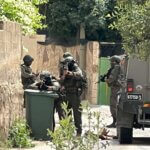55 buildings demolished in Al Maleh
 At around nine in the morning on January 17th, a demolition order imposed on the village of Hamamat Al-Maleh, which includes the community of Al-Mayta, was carried out by the Israeli army and police. The demolition crew also included an unidentifiable group of balaclava-clad workers. Residents were given forty days notice of the demolition order. In Hamamat Al-Maleh, twenty-five houses were destroyed, including eighteen in al-Mayta, displacing seventeen families. Another 33 structures used for keeping livestock, and therefore the livelihood of these communities, were demolished. 130 people live in al-Mayta, with around 37 families in demolished areas of Al-Maleh.
At around nine in the morning on January 17th, a demolition order imposed on the village of Hamamat Al-Maleh, which includes the community of Al-Mayta, was carried out by the Israeli army and police. The demolition crew also included an unidentifiable group of balaclava-clad workers. Residents were given forty days notice of the demolition order. In Hamamat Al-Maleh, twenty-five houses were destroyed, including eighteen in al-Mayta, displacing seventeen families. Another 33 structures used for keeping livestock, and therefore the livelihood of these communities, were demolished. 130 people live in al-Mayta, with around 37 families in demolished areas of Al-Maleh.
Hamamat Al-Maleh is a marginalized village located in the north of the Jordan Valley, near the Tayasir checkpoint.
Two busloads of soldiers, a number of jeeps and three JCB bulldozers descended from the military base and Maskiyot settlement complex, which overlooks Al-Maleh. The operation commenced from three points simultaneously, from two points in Al-Maleh, and further up the valley in Al-Mayta.
 Upon arrival, the army declared Al-Maleh a closed military zone, and refused entry to residents, observers and a delegation of medical staff whilst the demolitions took place. The masked, unidentifiable workers accompanying the army assisted in removing possessions from residents’ homes.
Upon arrival, the army declared Al-Maleh a closed military zone, and refused entry to residents, observers and a delegation of medical staff whilst the demolitions took place. The masked, unidentifiable workers accompanying the army assisted in removing possessions from residents’ homes.
One of the most crucial issues in the Jordan Valley is the privatization of water by Israeli authorities. Palestinians’ access to their own water is limited while this precious resource is redirected to Israeli settlements. Amongst the destruction, activists working with the Jordan Valley Solidarity campaign found water tanks which had been purposely destroyed. These water tanks were in a separate area from the structures slated for demolition. This is a key method that the army uses to make life for Palestinians so unbearable that they are forced to leave their lands.
Both Al-Maleh and Al-Mayta, like all villages in Area C, have suffered a continuous pattern of harassment by the Israeli army. They have been subject to repeated demolition orders and only two weeks ago were forced to leave their homes for one night, purportedly due to Israeli military training. A day after the demolitions, the army returned to confiscate all the community’s possessions, including food, bedding, and tents that had been demolished, leaving families with no means to rebuild their lives.







